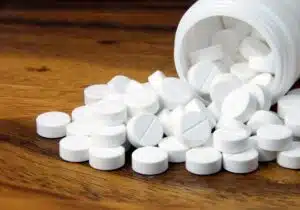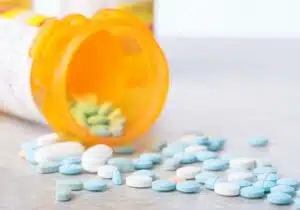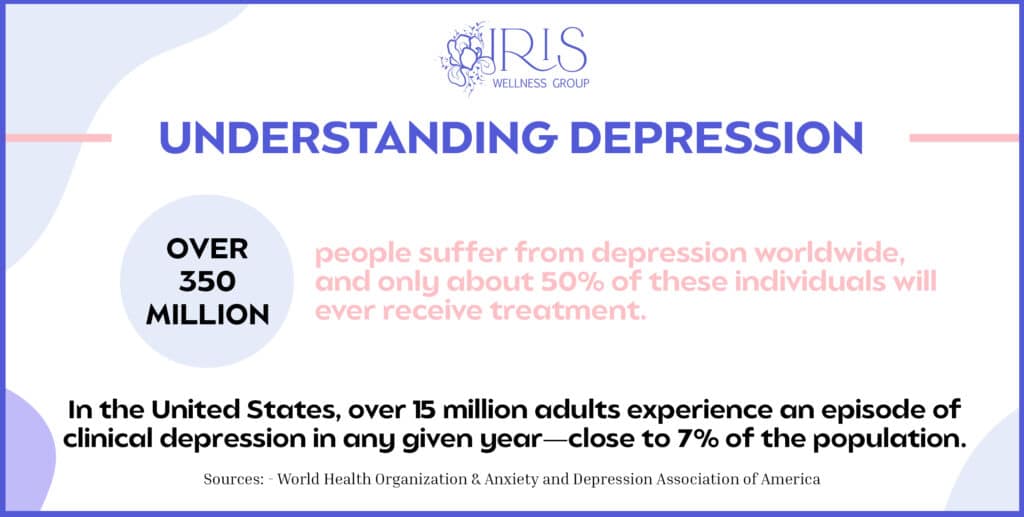Table of Contents
Data from the Tennessee Department of Mental Health and Substance Abuse, it’s estimated that 7.9% of the youth population, specifically those aged 12-17, have experienced a Major Depressive Episode. This statistic underscores the pressing need for mental health awareness and support for the younger generation in Tennessee. It’s essential to ensure they have the necessary resources and understanding to navigate such challenges.
What Is Major Depression and How Is It Treated?
Major depression (or “clinical depression”) is a mental health issue that can cause severe disruptions to a person’s overall quality of life. While everyone feels sad from time to time, a sadness that affects a person’s ability to function in their everyday life for weeks or months on end might be major depression. Suffering from major depression can be painful, but there is hope!
Learn more about Iris Wellness Group’s depression treatment in Chattanooga, TN, and find out how we can help you or your loved one overcome depression.
What Does Major Depression Look Like?
Major depression differs from other forms of depression due to the duration of the symptoms. If you are experiencing the following symptoms for the majority of the day for two weeks or longer, you might have major or clinical depression. When reviewing these symptoms, remember that sometimes medical or physical issues can also cause some of these symptoms. Always be sure to rule out any medical or physical problem by consulting a family doctor or primary care physician.
This is not a comprehensive list; however, these are some of the common symptoms of major depression:
- Cognitive (thought-processing and beliefs) Symptoms: Overwhelming feelings of guilt, worthlessness, emptiness, sadness, or hopelessness Ruminating and fixating on past mistakes or regrets Poor concentration or an inability to focus Thoughts of death or suicide Slowed thought processes.
- Behavioral Symptoms: Outbursts of anger, irritability, or agitation No longer engaging in or losing interest in pleasurable activities Slowed speech and bodily movements.
- Physical Symptoms: Changes in appetite leading to weight gain or loss Sleeping too much or too little Unexplained physical pain, like muscle aches with no root cause.
Overall, when someone just does not “seem like themselves,” they could be going through something emotionally difficult. People can become preoccupied with riskier behaviors to distract themselves from their thoughts. While coping with depression can be different for everyone, when a person engages in self-destructive or maladaptive behaviors, they might be on a downward spiral and need help. Iris Wellness Group’s clinical experts can help a person learn to identify their triggers and learn healthy ways to cope with their depression.
Depression Treatment in Chattanooga, TN
Iris Wellness Group understands that no two people experience depression in the same way. We offer a variety of methods for depression treatment in Chattanooga to help you find the best pathway to recovery!
Depression is commonly treated with a combination of these modalities:
Psychiatric:
- Medications can be effective in managing symptoms of depression
- Some medications can be used in the short-term as the person learns new coping skills and gradually stops using medications
- Other people benefit from the long-term use of psychiatric medications, due to chemical disruptions of the brain’s “feel-good” chemicals
Counseling and individual therapy:
- Often referred to as “talk-therapy,” many counselors or therapists are trained in various modalities to meet your needs
- Cognitive Behavioral Therapy (CBT) and Dialectical Behavioral Therapy (DBT) are two examples of evidence-based practices available at Iris Wellness Group.
Dual-Diagnosis Treatment
- “Dual-Diagnosis Treatment” refers to treating both depression and addiction (substance or process) simultaneously
At Iris Wellness Group, we know that treating both addiction and underlying mental health issues together is the best pathway for a successful recovery
Common Symptoms of Depression
Depression is not just a fleeting bout of sadness or grief. Instead, its symptoms persist almost daily for weeks or even extend to months and years, significantly affecting every facet of a person’s life.
There are various manifestations of depression. If you suspect that you or someone you know may be battling depression, it’s crucial to consult with a healthcare professional for an accurate assessment.
To be diagnosed with depression as per the Diagnostic and Statistical Manual of Mental Disorders, Fifth Edition (DSM-5), an individual needs to exhibit at least 5 of the following symptoms nearly every day for a minimum of 2 weeks. It’s essential to note that these symptoms shouldn’t be linked to another medical condition or the aftermath of substance use:
- Pervasive feelings of sadness or a depressed mood.
- A diminished interest or pleasure in day-to-day activities.
- Constant sentiments of self-loathing, insignificance, or remorse.
- Disturbances in sleep patterns – either oversleeping or insomnia.
- Unplanned weight fluctuations, either loss or gain.
- A consistent sense of exhaustion.
- Sluggish responses and movements due to decreased energy levels.
- Challenges with focus or memory retention.
- Recurring thoughts of death or an unusual preoccupation with dying.
- Contemplation of suicide or actual suicide attempts.
Depression’s symptoms can have a pronounced impact on an individual’s professional life, academics, familial relations, and social interactions. Those undergoing a depressive episode might find even mundane tasks, like getting up in the morning, overwhelming due to fatigue, and a general lack of motivation.
Activities and hobbies that once brought joy might now seem unappealing. Their emotional state might be evident through frequent bouts of crying, mentions of self-harm, or a heightened fixation on death and dying.
Witnessing a loved one grapple with depression can be both alarming and challenging. While it’s a natural instinct to offer solace or urge them to “get over it,” such gestures often prove ineffective against depressive symptoms.
Depression & Substance Abuse: Understanding the Dual Diagnosis
The relationship between substance abuse and depression is intricate and multifaceted. Studies have consistently shown that many of the underlying factors that precipitate depression also contribute to substance use disorders. This overlapping condition is often referred to as co-occurring disorders or dual diagnosis. The connection between depression and addiction often revolves around:
- Imbalances in Brain Chemistry: Similar imbalances can trigger both depression and addiction.
- Family History: Genetic predispositions may contribute to both conditions.
- Past Trauma: Emotional scars can lead to depression and, consequently, substance abuse as a coping mechanism.
Moreover, the physical and psychological impacts of addiction may either conceal the symptoms of depression or exacerbate this debilitating mental health disorder.
The Link Between Alcoholism and Major Depression
A compelling connection exists between alcoholism and major depression. In a comprehensive study encompassing 43,093 adults aged 18 and above, over 20% of those with a current alcohol addiction were found to also meet the criteria for a comorbid major depressive disorder.
Those seeking treatment for alcohol use disorders were observed to be over 40% more likely than the general population to have at least one mood disorder.
Alcohol, as a central nervous system depressant, may initially act as a stimulant but soon leads to heightened feelings of fatigue, drowsiness, and depression. Furthermore, alcohol consumption, due to its inhibition-lowering and judgment-impairing effects, may increase the risk of suicidal attempts among depressed individuals.
How Substance Abuse Affects Depression Treatment
Substance abuse, including alcohol and drug misuse, can negatively influence the trajectory of a depressive disorder. It tends to:
- Aggravate Depressive Symptoms: Substance abuse can intensify depression symptoms.
- Interfere with Treatment: It might increase hospitalization rates and hamper treatment.
- Decrease Therapy Effectiveness: Substance abuse can hinder motivation and reduce the effectiveness of depression treatments.
- Cause Dangerous Interactions: Alcohol or drugs may react adversely with medications prescribed for depression.
Therefore, individuals undergoing depression treatment in Chattanooga while battling substance abuse are unlikely to experience positive therapeutic outcomes unless both conditions are addressed simultaneously.
Dual Diagnosis Treatment: The Effective Approach
The most successful strategy for treating depression and substance abuse is an integrated program that combines mental health and recovery services. Such a program, known as Dual Diagnosis Treatment, employs professionals cross-trained in both fields. This approach ensures a comprehensive understanding of both conditions and a more effective, tailored treatment plan, thus providing the best chance for recovery and mental well-being. Iris Wellness Group offers depression and substance abuse treatment in Chattanooga, TN. Call Iris Wellness Group today to begin your depression treatment.
Exploring the Underlying Causes of Depression
Depression, one of the most widespread and incapacitating mood disorders, presents a complex mystery as the precise cause remains undiscovered. There is a consensus, however, around several contributing factors that play a significant role in its onset. A multifaceted understanding of the condition considers:
Brain Structure
There’s compelling evidence that people with depression may have structural differences in the brain. MRI scans have shown distinct variations in the regions responsible for mood regulation, cognition, metabolic functions, and sleep in those affected by serious mood disorders.
Environment & Childhood Experiences
The surroundings in which one grows up and experiences from childhood can heavily influence the likelihood of developing depression. Chaotic home environments or a history of physical, sexual, or emotional abuse can escalate the risk of depression manifesting in adolescence or later life. Trauma therapy often helps in healing the concealed emotional scars that may contribute to depression in adulthood.
Genetic Factors
Genetics plays a defining role in the neurological differences observed in people with depression. Studies indicate that individuals with a close family member (such as a parent or sibling) who has depression are 20 to 30% more likely to be affected themselves. Unlike disorders tied to a particular faulty gene, depression’s genetic links are likely more complex and connected to multiple genes.
Situational Influences
Certain life situations and major setbacks can act as triggers for depression. While common losses do not necessarily cause depression, significant events like the death of a loved one or a painful divorce might initiate a grieving period. If the feelings associated with these events are not adequately processed, they may evolve into depression.
Unlike mere bereavement, depression often plunges deeper, involving intense feelings of worthlessness, self-hatred, or even suicidal thoughts.
Brain Chemistry
The intricate relationship between brain chemistry and depression has been the focal point of research for neuroscientists and drug developers, aiming to provide relief for this incapacitating ailment. Neurotransmitters, the brain’s chemical messengers like serotonin, norepinephrine, and dopamine, play a pivotal role in governing our emotions, moods, energy levels, and even hunger. An imbalance in these neurotransmitters is often linked to the onset of depression.
Depression doesn’t root from a singular source. Often, it’s a confluence of various elements. For instance, an individual with a family predisposition towards depression might become more susceptible to the disorder after experiencing personal traumas or significant life changes, such as the end of a marriage.
Navigating Depression Treatment in Chattanooga
In Chattanooga, our treatment center is committed to providing specialized care for individuals battling depression, offering an array of outpatient programs tailored to varied needs. These include the Partial Hospitalization Programs (PHP) and the Intensive Outpatient Programs (IOP).
Partial Hospitalization Program (PHP):
Our Partial Hospitalization Program is an all-encompassing program, ideal for those seeking a higher degree of support compared to the regular outpatient methods. Within PHP, participants engage in day-time therapy sessions and group activities, and by night, they retreat to their homes or another nurturing environment. By acting as a bridge between inpatient and outpatient care, this program lets individuals find a balance between treatment and their daily lives.
Intensive Outpatient Program (IOP):
For those who need a step above regular outpatient therapy but don’t quite require PHP’s intensity, our Intensive Outpatient Program serves as the perfect choice. This program allows participants to join therapy sessions and group activities for a set duration weekly, ensuring they can manage their everyday responsibilities. IOP is especially suitable for individuals with pressing work or family commitments, and for added convenience, an evening IOP variant is available.
In addition to these structured programs, our holistic treatment approach encompasses:
- Nutritional Counseling: Providing a roadmap for healthier eating habits.
- Goal Development: Assistance in framing and reaching short-term and long-term objectives.
- Career Support: Guidance to navigate the professional world.
- Financial Mentorship: Expert advice on budgeting and fiscal responsibility.
- Accountability Building: Promoting a sense of responsibility and independence.
- Family Transition Planning: Crafting strategies to harmonize family dynamics.
- Organizational Techniques: Guidance for streamlining personal and household tasks.
- Life Balance Solutions: Recommendations on creating a harmonious daily routine.
By integrating these elements, we create an adaptable and comprehensive treatment journey that addresses the multifaceted challenges associated with depression. Our aim is to empower individuals with the tools and guidance they need to reclaim control and balance in their lives.
Seeking Depression Treatment in Chattanooga, Tennessee
Watching a loved one or family member grapple with depression can be heart-wrenching and taxing. Feelings of helplessness, exhaustion, and frustration are common when witnessing the trials of a depressive episode. Taking the step to approach someone about their depression and concurrent substance abuse is challenging but crucial. Without intervention, the co-existing conditions, both chronic in nature, may escalate, endangering the individual further.
Often, those battling depression feel ensnared in solitude, overwhelmed by a sense of powerlessness. Extending a helping hand and providing tangible solutions can bring about a transformative shift in their outlook. Iris Wellness Group stands as a beacon, offering Depression Treatment in Chattanooga, TN.
Depression Frequently Asked Questions
How to Help Someone with Depression?
Supporting someone with depression involves listening without judgment, offering encouragement, helping them access professional treatment, and being patient. Encourage small, positive actions and stay connected through regular check-ins.
What Causes Depression?
Depression can result from a combination of genetic, biological, environmental, and psychological factors. It’s often triggered by stressful life events or changes, and certain medical conditions or medications can also contribute.
How to Deal with Depression?
Dealing with depression involves seeking professional help, practicing self-care, staying active, maintaining a healthy diet, and staying connected with loved ones. It’s important to follow treatment plans and be patient with the recovery process.
What Does Depression Feel Like?
Depression can feel like overwhelming sadness, loss of interest in activities, fatigue, changes in sleep and appetite, feelings of worthlessness, and difficulty concentrating. It can also manifest as physical symptoms like aches and pains.
Do I Have Depression?
If you’re experiencing persistent sadness, loss of interest in activities, changes in sleep and appetite, fatigue, feelings of worthlessness, or thoughts of self-harm, it’s important to seek a professional evaluation for depression.
How Does Therapy Help in the Treatment of Depression?
Therapy helps in treating depression by providing a safe space to explore feelings, identify underlying issues, and develop coping strategies. Therapists can offer different perspectives, teach skills to manage symptoms, and help in creating a plan to prevent relapse.
What Are Some Treatments for Depression?
Treatments for depression include psychotherapy, medications like antidepressants, lifestyle changes, and support groups. In some cases, treatments like electroconvulsive therapy (ECT) or transcranial magnetic stimulation (TMS) may be recommended.
What Is the Best Treatment for Depression?
The best treatment for depression varies depending on the individual. It often involves a combination of therapy, medication, and lifestyle changes. A mental health professional can tailor the treatment plan to the individual’s specific needs.
Who is Chattanooga Depression Treatment Designed For?
Chattanooga depression treatment caters to individuals living in Chattanooga, Red Bank, Signal Mountain, Lookout Mountain, Southeastern Tennessee, Northern Georgia, or surrounding areas. These services are ideal for those who do not require medically supervised detoxification, have a stable and supportive home and work environment, and are self-motivated in their journey towards recovery.
Does Light Therapy Work for Depression?
Light therapy, involving exposure to artificial light, can be effective for seasonal affective disorder (SAD) and certain types of depression. It’s typically used in the morning and can help regulate mood-related chemicals in the brain.
What Is Outpatient Therapy for Depression?
Outpatient therapy for depression involves regular therapy sessions while living at home. It can include individual counseling, group therapy, and sometimes psychiatric services, allowing individuals to maintain their daily routines.
How Long Does Therapy Take for Depression?
The duration of therapy for depression varies. Some individuals see improvements within a few weeks, while others may need longer-term treatment. The length of therapy depends on the severity of the depression, the individual’s response to treatment, and the type of therapy used.
What Is Treatment-Resistant Depression?
Treatment-resistant depression refers to depression that doesn’t respond to typical treatment methods, such as antidepressants and psychotherapy. It’s diagnosed when a person has tried at least two different types of antidepressant treatments, taken at the right dose and duration, without significant improvement in their symptoms. This form of depression may require alternative treatment approaches, such as a combination of medications, psychotherapy, and possibly other methods like electroconvulsive therapy (ECT) or transcranial magnetic stimulation (TMS).










